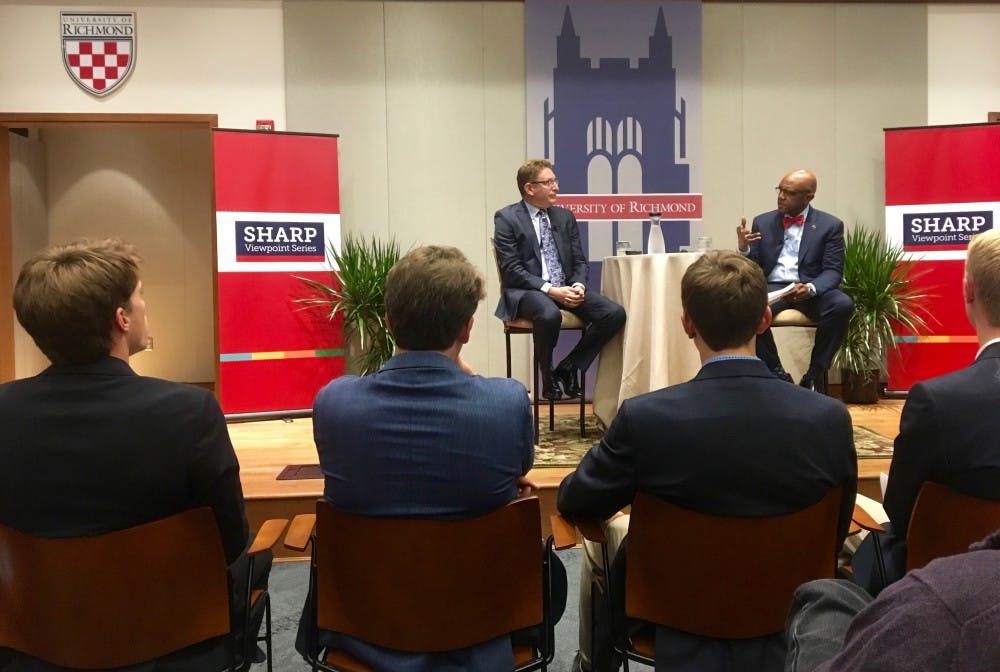On Wednesday night in the Breed Auditorium of the Queally Center, University President Ronald Crutcher welcomed Dr. Jeffrey Herbst, the former CEO of the Newseum and an old friend, to the stage to discuss free expression.
Herbst’s appearance was the first of five conversations this semester making up the 2017-2018 Sharp Viewpoint Speaker Series.
Herbst opened the discussion by stating his personal dedication to First Amendment rights and the controversies that surround them, which he believes have heightened in recent years.
“This is the greatest moment ever for free speech and free press,” Herbst said. “The web is the First Amendment realized. 17-year-olds can have 10 million followers on YouTube without spending any money whatsoever – we’ve never seen anything like that.”
According to a 2016 survey conducted by the Knight Foundations and the Newseum, 78 percent of students said colleges should expose students to all types of speech and viewpoints. But, according to the same study, most students also believe in censoring that freedom if speech is offensive to another group of people.
Herbst described this double standard as “an alternative understanding of free press and free speech in this country, and it really has to be disentangled.”
President Crutcher’s discussion with Herbst attempted to sift through these issues by answering questions concerning political correctness, the role of universities and faculty and the events in Charlottesville.
“In general, colleges and universities have done poorly in terms of protecting the rights around free speech and promoting as much dialogue as possible,” Herbst said.
He attributes this poor rating to ambiguity in university codes of conduct and attempts to dampen debate for fear of controversy or violence on campuses.
“The evidence is pretty clear that we’re shying away from a lot of difficult debates in a lot of social settings, in particular college campuses,” Herbst said.
Diagnosing the problems of expression on college campuses proves difficult enough, but curing them is a whole separate issue, Herbst said. Herbst offered some guidance to point the University of Richmond in the right direction.
“We have to get back to the First Amendment understanding,” Herbst said, “which public schools have to adhere to and private schools should adhere to, which is unless there are true threats of credible expressions of violence we should promote free expression.”
Enjoy what you're reading?
Signup for our newsletter
Throughout the evening, Herbst stressed the importance of allowing all viewpoints an equal playing field for expression, since those opinions will continue to exist whether or not they are voiced publicly.
“Viewpoint discrimination is not allowed,” Herbst said. “You can’t say ‘you don’t have First Amendment rights to speech or assembly because you believe something.’”
“I think the best way of addressing that is to make everyone feel confident and able to express themselves,” Herbst said.
Rather than ending speech that could be perceived as threatening, more speech is always better, he said.
When describing the importance of the demonstration in Charlottesville earlier this month, Herbst said, “It’s important for America to see that these people exist. We can pretend they don’t exist by not giving them permits, or throwing them off servers, but they’d still be there.”
Social media coupled with a decrease in trust of the media are leading the industry to evolve into what Herbst calls “the new order.”
“We haven’t seen the creation yet of a true set of news products that are fit for the digital age,” Herbst said.
College papers such as The Collegian can be instrumental in the fight for free expression, Herbst said. In a world of instantaneous updates, the larger picture of many stories is overlooked. Herbst's final piece of advice described the value added for college papers as making sense of troubling events.
“It’s not going to be done in 140 characters, and that’s why to some extent we’re in the golden age of long-form journalism," he said. "Unbelievable stuff is being done. Whether there’s a market for it is not clear.”
Contact managing editor Liza David at elizabeth.david@richmond.edu.
Support independent student media
You can make a tax-deductible donation by clicking the button below, which takes you to our secure PayPal account. The page is set up to receive contributions in whatever amount you designate. We look forward to using the money we raise to further our mission of providing honest and accurate information to students, faculty, staff, alumni and others in the general public.
Donate Now



